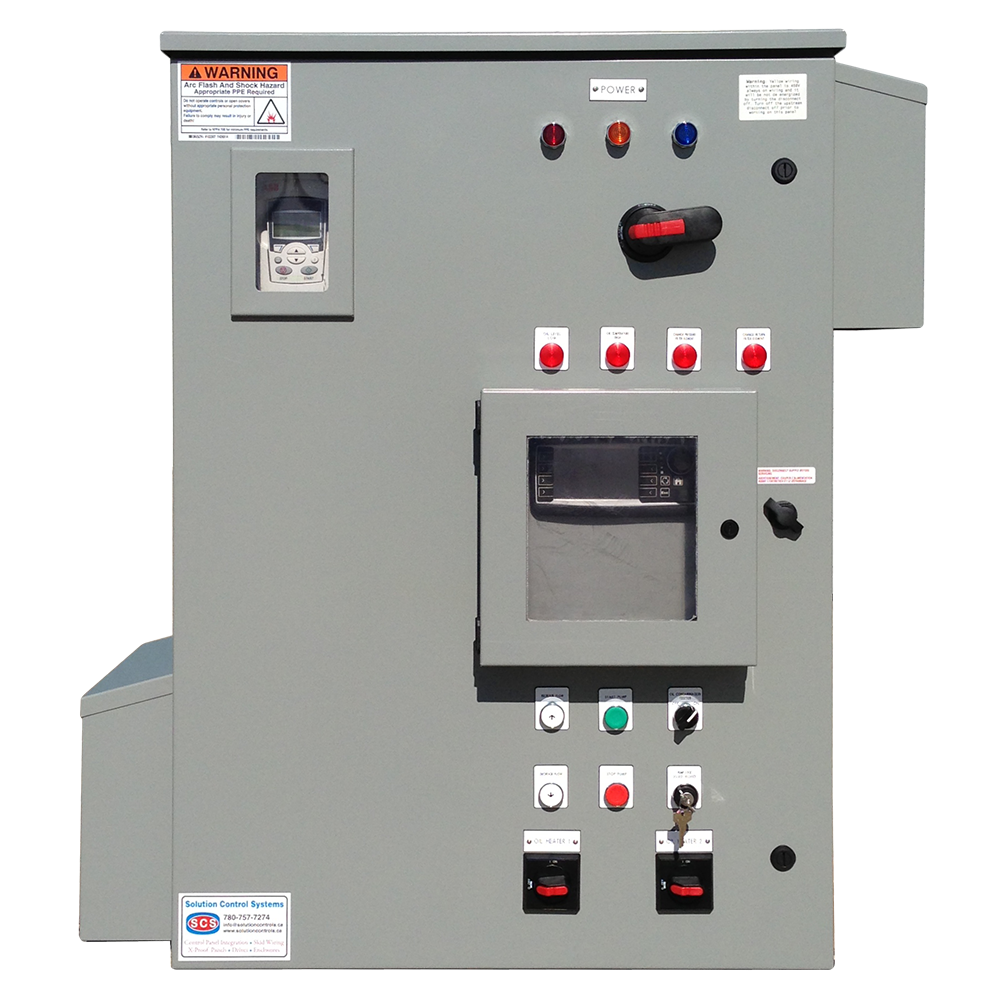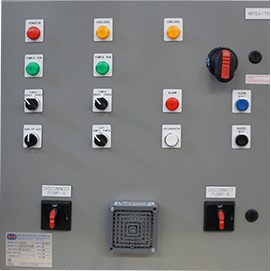Common Attributes of Electrical Enclosure
November 10, 2020

An electric enclosure is an open world of electrical equipment. It is mounted to protect the electronic equipment and its users from shockwave and surprise explosion. The section is exposed to users; hence it is necessary to ensure safety. Several other facilities like airport hangers or mines or mills have customized enclosure that ascertains its functioning and efficiency according to the environment. [ Read More ]
Guide to Perilous Zones for Electrical Enclosure Installation
November 9, 2020
Unlike PLC panels, every other electrical enclosure needs to ensure innate safety while installation. Three elements ignite the explosion in a perilous zone: Fuel, Oxidizer, and Energy. These are generally found in the industrial areas and buildings due to its heavy use during production procedures. [ Read More ]
Uses of Custom Control Panels in Industries
October 14, 2020
A custom control panel is a solution that has been built for the industrial purpose to regulate the power and improve the standard of electrical flow throughout the premises. This may be a unique one and it can be the control panel suitable for all locations. It can also be a solution for the complex challenges where there can be two installations that can look the same. [ Read More ]
Control Stations and Their Benefits
October 13, 2020
A control system is the brain of an industry. It is the station that coordinates many of its subsystems located in and around the industrial plant. They are very important as they play a major role in controlling the complex process in an industry. Especially for the large manufacturing plants, the top-down control and the coordination are vital and that can be done only by the control stations. [ Read More ]
Essential Factors to Consider When Buying an Electrical Enclosure
September 10, 2020
When selecting an electrical enclosure, it’s crucial to choose one that not only protects electrical components but also ensures safety, functionality, and long-term performance. An electrical enclosure safeguards sensitive equipment from environmental factors, physical damage, and electrical faults. Whether you’re purchasing an enclosure for an industrial facility, an outdoor installation, or a commercial setting, several factors must be considered to ensure the right choice. Below, we will explore the essential aspects to keep in mind when buying an electrical enclosure.
Features to Expect from a Custom Control Panel
September 9, 2020
A custom control panel is built as per the order requirements of the customer and is designed for a specific purpose. Custom control panels are unique in their designs and the material used to meet the exact requirements of the customer. Depending on the different types of operations, the types of these custom control panels vary. High efficiency of operation is always desirable from these panels as they are modulated to meet the needs of the customer. [ Read More ]
Benefits of Using Lighting Control Panel
August 17, 2020
Electricity has become one of the essential amenities in today’s modern world. Unfortunately, this is also one of the amenities that people have to take care of every month. Thankfully, you can now take care of your power bills with the help of a lighting control panel. Mentioned below are some of the benefits of why using a controlled lightening panel will be beneficial for you. [ Read More ]
The 4 Key Aspects Of The Design Of An Industrial Control Panel
July 13, 2020
It is necessary to be aware of the basic and essential elements/aspects while choosing an electrical control panel or cabinet. The electrical panels are exposed to certain environmental variables and need to store adequate components (in a proper way) for controlling the process machinery and the electricity consuming systems. Therefore, apart from the build quality, there may be many other aspects to consider when looking for an efficient and appropriate control panel design. Below are four of the critical and key aspects of the design of an industrial control panel, which should be evaluated carefully to ensure that a safe, cost-effective, and reliable option has been deployed to control electrical supply in a facility.
Choosing The Appropriate Industrial Automation Controller For A Process
Industrial applications require the controlling equipment, including enclosures and panels, for many different reasons. These panels (offered by reputed and credible control panel manufacturers) can provide for cost effective operations and convenient controls as well. With the adoption of digital computers and the availability of new technologies, we now have the Programmable Logic Controller (PLC) panels and systems that can be used to control many different processes of an industrial facility.
Pump Control Panel: Features, Design, and Key Functions
June 15, 2020

Pump control panels are the electric motors powering the mechanical pumps. Some of the crucial components of the pump control panel include:
- Power components- for controlling the pump motor.
- Sensors- for protecting the pump.
- Pilot devices- having the operator control features.
An automatic pump operation may also require certain additional sensors. The pump control systems may be designed and customized for the specific applications and made following the specific requirements of a customer. They may also be sold in pre-packaged and simple forms.
What is a Pump Control Panel?
A pump control panel is an electrical device that manages and monitors the operation of a pump system. It houses components like circuit breakers, motor starters, relays, and control switches to automate pump functions, protect equipment, and ensure efficient performance. Commonly used in water supply, wastewater, and industrial systems, it helps control start/stop sequences, overload protection, and fault diagnostics.
Key Components of a Pump Control Panel
Key components of a pump control panel include circuit breakers for protection, motor starters to control pump motors, overload relays to prevent damage, and control switches or push buttons for manual operation. Additional elements like timers, float switches, and PLCs may be included for automation and monitoring. These components work together to ensure safe, reliable, and efficient pump system operation.
Design and Working of a Pump Control Panel
A pump control panel may control more than one pump. They are connected to the monitoring devices and sensors so that they can obtain information about the different process variables needed for control purposes. Some of these sensors and control devices may include:
- Pressure sensors: that may be used to adjust the speed of the pump and to control it.
- Flow sensors: that can verify whether the fluid is flowing through the pump or not.
- Level sensors: ensure that dryness does not affect a pump.
- Temperature sensors: used to know whether the pumps are running at optimal temperatures.
- Motor overloads: to know whether any over current is affecting the pump.
Also Read: Factors to consider while selecting a Control Panel Design
Types of Sensors in a Pump Control Panel
Pump control panels use various sensors to ensure optimal performance and safety. Common types include level sensors (float or ultrasonic) to monitor fluid levels, pressure sensors to regulate system pressure, and flow sensors to detect movement within pipes. Temperature sensors may also be used to protect against overheating. These sensors provide real-time data, enabling automated control and efficient pump operation.
Controlling Features of Pump Control Panels
A pump control panel provides multiple abilities, including the ability to turn the pump’s power on or off, and the process control and process monitoring capabilities. The alarms may also be there.
The main power disconnect is for controlling the inflow of the main power. Pump controls may be present for controlling speed pressure, auto section, and system powering, among other aspects. A control device (including a float switch, a pressure switch, or a timer among others) can provide the directions, and a contractor switch may be used to turn the pump on/off. Monitoring may be accomplished through the status lights and the alarms for aspects like speed, pressure, and level. Pump control panels may also have the circuit breakers/fuses that may offer protection against the overloading and electrical faults.
All the components for providing the various functions are enclosed in an enclosure. An essential function of the pump control panel and enclosure, apart from running the pumps, is to protect those handling it. Hence it is vital to procure the pumps from a leading and reliable enclosure and panel manufacturer.
Also Read: Four Aspects of a Good Industrial Control Panel
Why is a Pump Control Panel Important?
A pump control panel is essential for safe, efficient, and automated pump operation. It protects equipment from electrical faults, manages start/stop functions, and ensures consistent system performance. By integrating sensors and safety devices, it helps prevent overloads, dry runs, and other failures. In industrial, commercial, and municipal applications, it enhances reliability, reduces downtime, and supports effective system monitoring and control.
Conclusion
A pump control panel is a vital component in any pumping system, offering automation, protection, and efficient control. It integrates key components and sensors to optimize performance, prevent damage, and reduce maintenance. Whether for industrial, municipal, or commercial use, investing in a well-designed control panel ensures long-term reliability, safety, and energy efficiency in pump operations.
Understanding The Basics Of Industrial Control Panels
The NEC or National Electric Code defines industrial control panels as an assembly consisting of two or more components forming power-circuits. It may also be any other combination of control and power circuit components. The panels often come in pre-assembled forms, and the factory-fit and wired assemblies include different and multiple control equipments like the motor controllers, switches, relays, and other components. One important aspect to note here is that an industrial panel listed in UL (Underwriters Laboratory) will not have an externally connected load.
Solution Control Systems Acquires Altek Power and Controls to Expand Switchgear Offerings
June 4, 2020
Solution Control Systems is proud to announce the acquisition of Altek Power and Controls.
With this exciting acquisition, effective immediately Solution Control Systems will be offering LV and MV custom switchgear solutions in addition to our diverse controls product portfolio to better serve our clients. With our team of expert and challenge-loving designers, we are driven to finding the solution for your switchgear needs.

